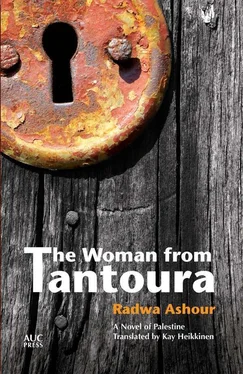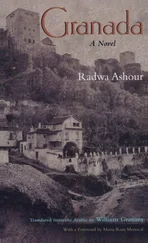“I’m about to finish and go to bed. What are you doing, is this the time to pack?
“I’m getting ready to go.”
“God bless you, as long as you were going to accept my move to Sidon anyway, why did we spend all these months arguing?” I was talking about Sadiq’s determination to rent an apartment in Sidon. He asks and inquires and inspects and compares: an apartment on the fourth floor with a balcony overlooking the sea and big windows open to the sky and the sunlight? “It’s great! What do you think, Sadiq?” “How will it hold us all when we come in the summer?” Another, bigger apartment, five rooms. “It’s far from the sea, and the building is old.” A third one, new, and overlooking the sea. “The building has no guard.” Finally we find an apartment that meets all of Sadiq’s conditions: it’s new, large, sunny, near the sea, and has a guard with a strong build and a kind face. Sadiq checked everything about him, and announced with delight, “The guard’s grandfather knew my grandfather Abu Amin, and his grandfather’s brother worked in Acre in the days of Palestine; I visited his village two years ago. Now I can rest assured, as if I were the one guarding the building. Fine, I’ll sign the contract tomorrow.” Then Sadiq meets the neighbors: “I’m not comfortable with them. Neighbors are family, closer than family — you’ll be alone for months at a time, and I won’t be able to rest easy having you among them.” Sadiq wasn’t the only one looking, either: he brought in his friends old and new, and the young men of Ain al-Helwa, some whose relatives he had employed or whose education he had paid for, and their friends and their friends’ friends, until it seemed as if all of Sidon was preoccupied with Sadiq’s search for an apartment for his mother.
At last we rented an apartment, we furnished it, and he left.
God bless you, Sadiq, what have you done? It’s as if I were a pupil in a strange town: before he left he appointed not just one guardian but a whole host of guardians for me, young and old. As I told Maryam on the phone, I had imagined that I would be alone for a few months at least, gradually meeting a neighbor here or there or finding some of my old acquaintances in Sidon, and reconnecting with Karima’s family. I figured wrong, as if I didn’t know Sadiq: one week in Sidon and he rented an apartment, furnished it, and turned it into a madafa. He introduced his friends to the house and to me, “And I don’t have to tell you, guys ….” The young men living in Sidon would ask after me daily, and those who lived in Ain al-Helwa would come all the way into Sidon to ask. Sometimes they would be too embarrassed to come in and have a cup of coffee; sometimes they would come with their mothers or wives and children, and invite me to their homes. My God, how much Sidon has changed, and how much the camp has changed!
Hasan asks me on the phone, and I say, “It’s the same, the sea, the castle, the Khan al-Afranj, the old quarter, and the vegetable market.” A moment of silence, and then I add, “There are new buildings, with many floors.”
“And the camp?”
I keep silent; he repeats the question.
“The situation there is difficult.”
He asks about the site of our new house; I tell him the name of the street and the number of the building.
“How far is it from the old city? Tell me the way, Mother.”
I laugh, and say, “Are you going to surprise me with a visit? You won’t get lost in Sidon, Hasan. As soon as you arrive ask for the street and not one but a thousand people will tell you the way.”
“Tell me where it is from the Jad Building.”
I can’t find an answer that satisfies him. The buildings that were destroyed, were destroyed, and new buildings were put up in their place. Why does he remember the Jad Building specifically? I no long remember where it was. What does Hasan want, to imagine the site of our new house or to redraw the city on paper, in a map like the many maps he excelled at drawing when he was little? How will he combine the city that was destroyed and the new city that was built on the ruins in one map?
He can’t come to Lebanon to visit me, Sadiq was right about that; he had caused a huge commotion. Sadiq had called me in Alexandria, and said, “Call Hasan and try to talk him out of this stupidity. We don’t need to add complications to our lives, by our own free will. He doesn’t want to listen to me, but maybe he’ll listen to you.” Hasan had decided to travel with his wife, saying he would visit Palestine. Sadiq went crazy, and said, “You’re visiting Israel. Yes it’s Palestine, but officially it’s Israel, and once they put the state stamp on your Canadian passport in their airport you won’t be able to visit most of the Arab countries. You’re not Canadian, even if you have a Canadian passport. Your name is Hasan and you were born in Sidon. Go convince the passport officer in Syria or in Lebanon that you just wanted to visit your country! Use your head, Brother, that’s just the way it is, there’s nothing you can do! Your visiting Palestine is a luxury we can’t afford. How will you visit me, how will you visit your mother? And if Maryam got married in Syria or Lebanon, how would you visit her?” Sadiq was repeating to me the conversation he had with his brother on the phone. “He told me, ‘Mama lives in Alexandria, and I can visit Egypt with no problem.’ I didn’t tell him that you’re living there temporarily, and that as soon as Maryam graduates you’ll come back to live with me in Abu Dhabi. I didn’t tell him because my blood pressure was sky high, so I ended the call.’”
Now Hasan asks me to describe our house; he can’t come to Lebanon, and my heart aches for him. I think, Sadiq was right; then I take it back. Hasan had wanted to visit Palestine; how did it look to him? He did not call me in Alexandria during his visit, he did not telephone me to say, “I’m in Tantoura, Mother, I’m standing on the seashore there.” He did not write a letter about his trip, and he didn’t even talk about the trip when he visited me later in Alexandria. He didn’t tell me about Tantoura, or al-Furaydis or Haifa or Lid, even though Fatima told me that he spent a month going everywhere. She said, “He visited the coast from Acre to Gaza, the West Bank from Nablus to Hebron. He spent three weeks in Jerusalem, and visited Wisal in Jenin. He went to Randa’s family in Nablus, and met relatives in al-Furaydis, and met friends he had met in Canada, going to meet them in Nazareth. He visited the Negev.”
But Hasan did not tell me. Strange! As if he were stricken with the same silence that once struck me.
The doorbell woke me. I looked at my watch, it was one a.m. Who can be knocking on the door at this hour? I open, and I scream — Abed and Maryam are standing before me! Abed laughs and Maryam says, “The jack-in-the-box only pops up in the middle of the night!” After hugs and laughter and flying half sentences and a quick tour of the house, “because we want to get to know our new home,” we move to the kitchen.
“I’ll make supper for you.”
“We ate on the plane.”
“We want coffee.”
Maryam insists that she make the coffee: “Where’s the coffee, where’s the sugar, where do you keep the cups?”
The talk takes us far and wide, and the coffee boils over. We make another pot and take it to the living room.
Abed says, “Now we have a problem, and we want a solution.”
Is he joking? He’s speaking seriously; what’s wrong? I’m apprehensive.
“Maryam resents me!”
So they’re joking. Maryam says, “There are well-founded reasons for resentment, and also for fear. My vacation is five days, I’ll take off and leave Abed with you for a whole month. First, that’s not fair, second ….”
Читать дальше












